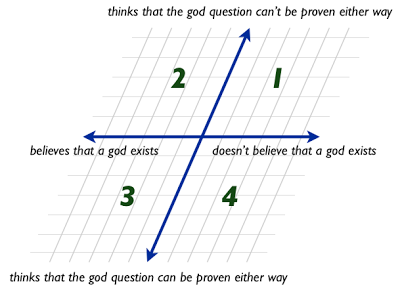What’s the difference between an atheist and an agnostic?
One of my atheist friends recently surprised me by describing himself as a Buddhist. I tried not to do a double-take, reminding myself that is possible to distinguish ‘Buddhism the Religion’ from ‘Buddhism the Philosophy’ or ‘Buddhism the Set of Interesting Practices’. Still, it seemed incongruous.
And then there’s my other friend who describes himself as an ‘agnostic’, but doesn’t really disagree with me, the atheist, on any major points. He just seems reluctant to define himself as an atheist.
Deciding what a word ‘means’ can be a tricky proposition, especially on this issue when self-identification comes into it. People are defining ‘atheist’ and ‘agnostic’ by the beliefs of people they know who identify as atheists and agnostics (perhaps even themselves). I’ve met enough meat-eating vegetarians to know that this isn’t the most reliable kind of definition. Then some helpful soul comes running into the discussion with a dictionary, telling us about word parts, and insisting that the etymology of a word is its ‘true meaning’. Which is nonsense, because word meanings change over time, and words mean what speakers think they mean. (Except when the speakers are wrong because they disagree with us more knowledgeable folk.)
Word-watcher that I am, I’d normally observe the debate and not influence it. But as an atheist, it’s a different story. I’ve noticed that the popular definition of these terms is often at variance with what atheists and agnostics actually think, and that ought to count for something. So in this post, I’d like to discuss the definitions of a*ism, and see if we can describe them more accurately in terms of what people (a*ists and not) mean by these terms.
As a English-speaking youth, before I’d thought about this area very much, I absorbed these definitions:
atheist: someone who knows (believes very strongly, is absolutely certain that) there’s no god
agnostic: someone who doesn’t know if there’s a god or not
That is, the difference (I thought) was one of degree of certainty.
At the time, it didn’t seem to me that this ‘atheist position’ was very tenable. How could you be certain that something didn’t exist? You’d have to have a knowledge of everything that existed to know that something wasn’t on the list. Which, ironically, would make you God, or something close.
Well, imagine my surprise to find that no atheist I talked to held that point of view. No atheist I’ve met on- or off-line has professed absolute certainty that god does not exist, though there are some ‘strong atheists’ out there. Instead, atheists I have met reject gods because there’s no evidence for them, and many have expressed willingness to change their minds if evidence turns up.
So if certainty is not the defining characteristic of an atheist, what is? Simply: belief. Atheists believe there are no gods. Here comes the etymology: a, ‘without’ + theos, ‘god’. Someone who is without a god.
Now for agnostic. Etymology: a, ‘not’ + gnosos, ‘knowledge’, or ‘one who doesn’t know’.
A browse of various dictionaries suggests that agnosticism is less about intensity of belief and more of a philosophical stance involving the knowability of god, usually expressed by these two ideas:
1) An agnostic doesn’t know whether gods exist
2) An agnostic thinks the whole question isn’t really knowable
I find both of these ideas perfectly reasonable — to a point. Can we know if a god really exists, if that god hides from people and is perfectly good at covering her tracks? No, any more than we can know about UFO’s or invisible pink unicorns. Where I differ from agnostics is what to do about it. With no supporting evidence, I just assume it’s all bogus, but I’ll re-examine if need be. The agnostic reserves judgement, as though the two possibilities are equiprobable, and that’s simply not justified by the data we have.
What I get from these definitions is that atheism and agnosticism are not mutually exclusive categories. They’re describing two different things. Here are, I think, more accurate descriptions:
agnostic: Someone who recognises that the ‘existence of gods’ issue can’t be proven either way with the evidence we have. Agnosticism tells more about what you know about the ontological issues surrounding supernatural beings.
atheist: Someone who doesn’t believe that gods exist. Whether you’re an atheist or not has more to do with what your conclusion, yes or no, given all of the uncertainty surrounding the issue.
That explains why my self-described agnostic friend and I agree on the issues. He doesn’t know if gods exist, and to be perfectly honest, I don’t know either, I just don’t find the evidence compelling. So in that sense, my friend and I are both agnostic. And neither of us really thinks that gods exist, though we’re open to evidence. So in that sense we’re both atheists. I’m just more willing to call myself an atheist than he is.
We could plot individuals on a graph:

Quadrant 1 is me, the non-believer who nonetheless says you can’t be absolutely certain either way. Quadrant 2 is the believing agnostic, also known as ‘the bet-hedger’. (If I were a god, I would send them to hell for believing in me in such a gain-driven and cowardly way.) Quadrant 3 is the believer, and in quadrant 4 we could perhaps find the ‘strong atheist’.
These definitions are pretty close to what people already think the terms mean. Defining them this way emphasises certain aspects of a*ism in a way that helps to explain the variation in belief that we see, and gets rid of a lot of overlap between the terms.
People will still define atheism and agnosticism variously, but there are signs that this view I have presented has some acceptance. I was somewhat startled at this site, devoted to sorting out frequently confused words. The entry for ‘atheist’ reads:
atheist: one who assumes there are no gods or divinities but will accept the possibility should extraordinary evidence occur
agnostic: one who believes the existence of God cannot be proved or disproved
I fully approve.
 From the world of art:
From the world of art:




Recent Comments